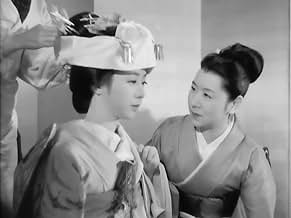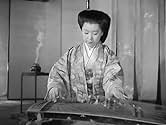Adicionar um enredo no seu idiomaShinnosuke is introduced to Shizu as a prospective wife, but he falls in love with her widowed sister Oyu. Convention forbids Oyu to marry because she has to raise her son as the head of her... Ler tudoShinnosuke is introduced to Shizu as a prospective wife, but he falls in love with her widowed sister Oyu. Convention forbids Oyu to marry because she has to raise her son as the head of her husband's family. Oyu convinces Shinnosuke and Shizu to marry so that she can remain clos... Ler tudoShinnosuke is introduced to Shizu as a prospective wife, but he falls in love with her widowed sister Oyu. Convention forbids Oyu to marry because she has to raise her son as the head of her husband's family. Oyu convinces Shinnosuke and Shizu to marry so that she can remain close to Shinnosuke.
- Direção
- Roteiristas
- Artistas
- Direção
- Roteiristas
- Elenco e equipe completos
- Produção, bilheteria e muito mais no IMDbPro
Avaliações em destaque
The main topic of the movie is forbidden love, and more generally the impossibility of being happy in this world, which are very characteristic themes in Kenji Mizoguchi's films. The film illustrates also some typical aspects of J. Tanizaki's work, like the 'physical' (facial) influence of a mother on the future emotional life of her son, or the fear of scandal and of losing one's face in society.
This film shines through the purity and the intensity of the emotions of the protagonists (hidden for a long time, they erupt violently), through the marvelous performances of the actors and through its forceful message about the all importance of love. A must see.
There's really not much to say about the technical aspects in this film, if you know Mizoguchi's directing you know you're in good hands. Anyway though, as usual, the scenes are beautifully shot. I even found myself really liking the music here, it adds perfectly to the atmosphere.
Overall, this is another another great film from Mizoguchi that's worth the time.
Kenji Mizoguchi's movie is not one of his great movies, but it is an impeccably executed bit of soap opera. All three principals are aware of each other's feelings, and nothing is said. When Miss Tanaka's son dies, she is thrust from her home, her brother will not take her in, nor can she move in with her sister -- the gossip would only increase.
As I said, it's not one of Mizoguchi's major works, but that doesn't mean he did a shoddy job; he seemed incapable of that. The last two shots, with their subjective cameras, are heartbreaking.
For a few moments, Truffaut's film Jules and Jim from 1962 immediately came to mind.
This is a top class example of the type of movie that resulted. The term 'womens movie' can seem a little derisive - but this was simply the market they aimed for. It is an adaption of a well known and respected book from the early '30's, although it is set in contemporary times, while the original was set in the Meiji period. In the excellent Masters of Cinema DVD, Tony Rayne's introduction suggests that Mizoguchi wasn't particularly proud of the movie, one reason being that he was forced by the studio to miscast Kinuyo Tanaka as the eponymous heroine, rather than a more elegant, disciplined actress (Hara Setsuko comes to mind as someone who would have played this beautifully). There is certainly a problem with the movie in that she plays the character as a more forceful, modern woman than was probably intended. But I think only those who read the book would find this a major problem.
The story concerns a young man who rather inconveniently falls in love with the beloved older sister (Miss Oyu) of his intended bride. His bride insists on going ahead with the marriage, but without consummating it, so that he can be close to Miss Oyu, who is a widow who must live at home with her in-laws to take care of her son, but by tradition is not allowed to remarry. Over the years the three-way relationship takes some predictably tragic turns.
The story is far more melodramatic than the movies of this period by Ozu or Naruse. It could have been pretty horrible in the hands of a less skillful director than Mizoguchi. But his astonishingly beautiful sets and his famous one cut scenes sets the movie apart. It really is gorgeous to look at.
These stories were and are seen by some Japanese as problematic, as they can be seen as romanticizing archaic sentiments. To my western eyes, I found it utterly fascinating. The manner in which people struggle under arranged marriages to find love and happiness is utterly alien to westerners, yet still compelling. I had somewhat low expectations about this movie as several sources dismiss it as very minor compared to Mizoguchi's pre-war and later period masterpieces. It is certainly not a work of genius to match Sansho Dayo or Ugetsu, but I found it riveting viewing and certainly not a minor movie by any standards.
Você sabia?
- ConexõesReferenced in Kenji Mizoguchi: A Vida de um Diretor de Cinema (1975)
Principais escolhas
Detalhes
Bilheteria
- Faturamento bruto mundial
- US$ 5.020
- Tempo de duração1 hora 34 minutos
- Cor
- Mixagem de som
- Proporção
- 1.37 : 1
Contribua para esta página


























